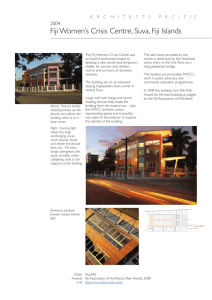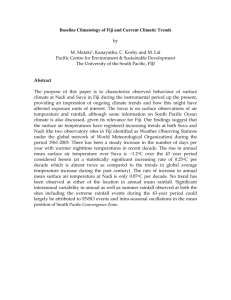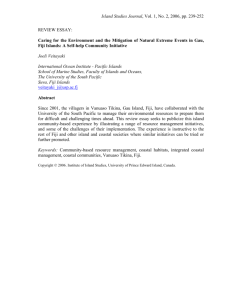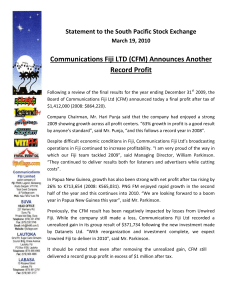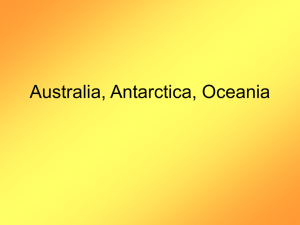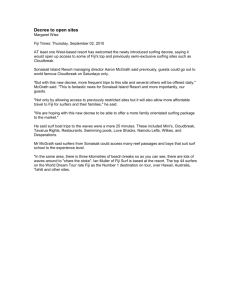Speaker 1 - Devpolicy Blog from the Development Policy Centre
advertisement
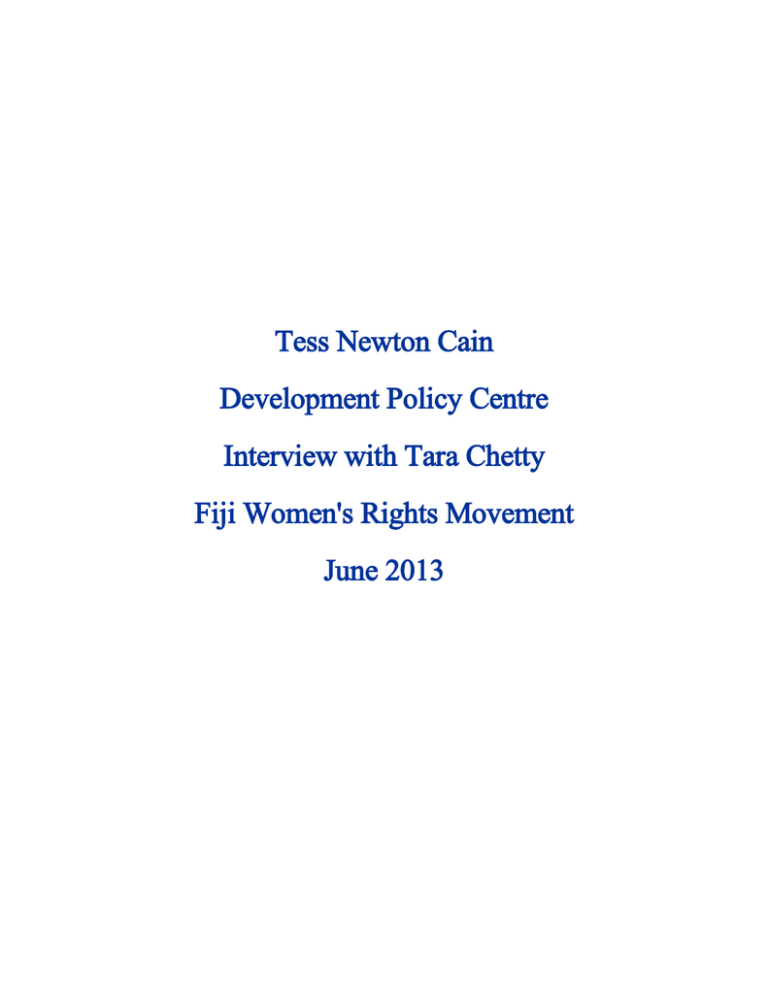
Tess Newton Cain Development Policy Centre Interview with Tara Chetty Fiji Women's Rights Movement June 2013 Tess Newton Cain, Development Policy Centre Interview with Tara Chetty, Fiji Women's Rights Movement June 2013 Tess: My name is Tess Newton Cain from the Development Policy Centre in Canberra and this week I'm in Fiji, which is great. And particularly exciting is that I have an opportunity to talk with Tara Chetty, who is program director at the Fiji Women's Rights Movement. So Tara, thank you very much for making some time available this evening for us to have a chat. Tara: Great to be here Tess. Great to have the chance to have a chat about some of these very interesting questions that you've come up with. Tess: Okay. Well let's kick off with my first question, which is about the work of your organisation, the Fiji Women's Rights Movement. And in particular, how FWRM has participated so far in the processes surrounding the drafting of a new constitution for Fiji. Tara: Yeah, that's a really interesting question because we've been really at the forefront of women's engagement in this area through a collective known as the Women's Forum. So the Women's Forum is made up of four organisations: Fiji Women's Rights Movement; femLINK Pacific, which is a community media, women's media networks organisation; Soqosoqo Vakamarama, which is a network of indigenous Fijian women through the traditional village networks; and the National Council of Women, which is the women's machinery umbrella bodies which are throughout the Pacific. So these four organisations have come together as the Women's Forum. The inaugural one, which was kind of a gathering together of women leaders from around the country, happened in April 2012, and we sort of set our women's leadership agenda in the lead-up towards a return to democracy. And part of that was really then looking at the government's agenda in terms of the constitution and trying to reframe that from our perspective in terms of how we wanted to engage with it and what we wanted to see in a new constitution. So we had a Women's Forum in April, a second one in June to really hone in on what strategies we had in mind, and then a follow-up one in December, and then a more focused one just earlier this year in terms of Women and Politics. So basically what the women then - we broke up into a few different areas. A few of us went off to do analysis. A few went off to mobilise around civic education in getting women involved in the constitution-making process in trying to enable their submissions. So that was a very successful process in relation to the Ghai Commission. And what they came out with, the Ghai Draft is also known as the People's Draft, which reflects the level of integration of particularly women's perspectives as well as other communities, other groupings into that draft. So there was a lot in there in terms of things we were very concerned about like temporary special measures for women's political participation. That was included in the draft. There were very comprehensive sections around gender equality in the Bill of Rights. And a lot of really, that spirit of getting women, enabling women's participation in decision-making was throughout the constitution - we felt. Page 1 Tess Newton Cain, Development Policy Centre Interview with Tara Chetty, Fiji Women's Rights Movement June 2013 Tess: Okay. What about what happened subsequently? Because obviously as we know the Ghai Draft is no longer the working draft. There is now a new draft. And I understand that one of the concerns of your grouping, that Forum, is that some of those aspects that you've just outlined are no longer present. So how has that affected your strategies more recently? Tara: So it's quite interesting, the timing of everything. I think to answer your question in a slightly roundabout way, just to give the background, the Women's Forum created an example of how you create a democratic space in a non-democratic context. FWRM took that example to a broader level, partnering with the Citizens’ Constitutional Forum to create the People's Constitutional Forum, so a people's forum model based on the women's forum model. And it was in this space at the moment we were having this People's Forum that the government released their draft and also informed the public they had cancelled the Constituent Assembly. So that process of a more representative forum perhaps for people to debate a draft constitution had been eliminated. So the People's Forum, which was made up of all different sectors, became in effect a sort of people's constituent assembly where we debated - we had been looking at the Ghai Draft, but then very quickly mobilised to have a look at the government draft as well and compare, and of course came out with some big concerns about the absence of women in the government's draft and the really paring down and limiting of rights in the government's Bill of Rights. So what was interesting to see within even the People's Forum's dynamics was how the women of the Women's Forum quickly mobilised. When the drafts came out, the announcements came out, you could see the women caucusing and getting together and saying, okay, what now? And what now was a public statement by the Women's Forum, the co-conveners. And then they also decided to - that was kind of a reactive thing - but also decided to continue with the proactive opening up and creating of our own space and trying to keep things to the women's agenda rather than just conforming with whatever had been issued by the government. So they continued with plans for the 4th Women's Forum, which they had later the following month, which was focused really on Women in Politics and getting us ready for the next stage beyond the constitution. But also it was a chance to discuss what are the implications of what the government is proposing? And given the very short time - I think it was about three weeks maybe - that the public was given to comment on this really radically reframed constitution, the women did manage to get out into a couple of communities and have a discussion and invite other women to make submissions to government processes, although that was more a chance for people just to have a conversation about it, because it's Page 2 Tess Newton Cain, Development Policy Centre Interview with Tara Chetty, Fiji Women's Rights Movement June 2013 very unclear how the public submissions, how the public feedback will be incorporated, if at all, into the government draft. So what we've basically, in sum, what we've really tried to do is keep to our principles of the Women's Forum that have come out - the human rights-based approach, pushing temporary special measures for women - just continue on that track to see, okay, if the constitution is shutting us out, if the government process is shutting us out, what else can we do? So some of the things to look at in the future may very well be to try and work with political parties to push women and decision-making through them and to try and empower women as candidates in this process. Tess: Okay, so maybe to pick up on that point and also something that you did mention earlier, from the FWRM perspective, what do you see as the opportunities and challenges for increasing the role of women in political representation in Fiji after 2014 when we are expecting there to be elections? Tara: Sorry, the opportunities and challenges? Tess: Yeah. Tara: I think that any point of disjuncture, in any point when the social contract in a way is being renegotiated, there is an opportunity. So the Pacific as a region has the lowest, among the lowest representation of women in formal decision-making. In this new, as we're embarking on kind of a return to democracy and we're creating a new framework, perhaps now it's really important to keep pushing this. This is the moment to push this agenda. It's not, let's return to democracy and deal with women's issues later, as is often pushed in a broader pro-democracy framework. Now is the moment to make the commitments to this, to push political parties to make commitments: on paper, in practice, to women. So if there's going to be this radically different electoral process - big electoral divisions, big constituencies, a proportional representation system then what we've been doing is equipping ourselves with the knowledge. What works best for women? And pushing that. So for us it's been, what we've come to understand is, we need, if we're going to go with proportional representation system, we need a closed list, closed zippered list, which is kind of a man-woman, man-woman list proposed by political parties, which will allow a greater chance for more women to get in. So that's kind of the technical aspect of it that we've equipped ourselves with. And now we've pushed that through the constitution. That we feel is probably largely getting blocked. Now is our moment to try and work through, work with the political parties. So coming up next, coming up for the next 12 months for us is working with political parties on their manifestoes to get women's issues in, working to upskill women candidates and get more women as candidates in the next election, and then also working on the other side - working with voters, women as Page 3 Tess Newton Cain, Development Policy Centre Interview with Tara Chetty, Fiji Women's Rights Movement June 2013 voters, and also just some general public awareness level to try and get Fiji voters to recognise women as leaders and to vote for women. So those are the several prongs we're going at. Those are the opportunities that we're trying to reframe. The challenges are many. We're in a military-run government, military-run state that is inherently hostile to women and has been particularly hostile to efforts to get better representation of women decisionmaking through a new constitution. Categorically they've said no, no temporary special measures, no affirmation action. So that's been a very difficult place to get any traction on. We are, within this, we are existing within a fairly conservative cultural context, which is also in and of itself quite hostile to women decision-making in a more general sense. We have women chiefs, but women have a fairly subordinate role in households, and it's been quite difficult. That said, we have at the same time, relative to the rest of the Pacific, a very vibrant civil society, a very active women's movement, a very active kind of human rights movement. So that's where the opportunities lie in trying to push back at some of those challenges. Tess: Okay. Thank you for that. That's a really good exposition of those issues. I want to move on in a while to some wider questions about political engagement, but before I do that, I guess as sort of a related issue is one about gender-based violence, because I think, as we know, that's a very particular manifestation of some of the challenges that you've identified in that political space. And, as we know, it's a very significant issue throughout the region. Based on what you know and your conversations that you have with your colleagues in related organisations, what do you think is the significance of that issue currently in the Fiji context? Tara: Gender-based violence. Gender-based violence remains a really serious issue in Fiji. Our sister organisation, the Fiji Women's Crisis Centre, takes the lead on this issue in the country. But all of our work is in some way attempting to address this. Pacific rates, the rates of gender-based violence in the Pacific as you said, are just monumental. It's a serious problem. And in Fiji, it's very difficult often to gauge the level of the problem because of the methods of data collection. So for example, you know, a bit of a disjuncture between the health sector and the judicial and the police sectors. So where your cases and incidents and patterns are slipping through the cracks. The Crisis Centre does a lot of work through its service delivery to capture some of that picture. And what they're suggesting is that anecdotal evidence is suggesting that in the context of a militarised state, in the context of political crisis in a kind of entrenched socio-economic crisis that goes with it, that tends to exacerbate the levels of gender-based violence, partly because of the kind of machismo that accompanies that kind of state overthrow, that kind of militarised context, but also Page 4 Tess Newton Cain, Development Policy Centre Interview with Tara Chetty, Fiji Women's Rights Movement June 2013 because of how it damages efforts to address gender-based violence that have gone in the past. For example, all the work done on no drop policies. All the work done with kind of police force in the past that gets dismantled and rolled back when that police force becomes militarized. Or when women's NGOs become persona non grata in relation to the state. So it's the dismantling of work that's gone on before that then exacerbates the situation. Tess: Okay. Thanks. I think that's a really important point. I think obviously it's particular to Fiji, but I can see also that it resonates also to other countries, sometimes just a changing government can mean all of that stuff can get rolled back, as you said. I'd like to come back to the political landscape of Fiji a little bit more generally. And you've made reference to the impact of military rule. Looking a little bit more broadly, how do you think that this prolonged period of military rule has affected political engagement in Fiji more generally. I guess both in terms of the quantity of political engagement and possibly even the nature and the quality of that engagement? Tara: Yeah. That's, I find this question very interesting, because you're hitting on a very serious problem for a country trying to rebuild democracy, trying to build a lasting democracy. Having been in such a prolonged period of un-democratic rule, military rule, has got serious implications. And in particular it's when you look at young people. In the coming elections, we are expecting the voting age to be dropped to 18, and we're looking at a huge, a whole host of new voters. Fiji is quite representative in terms of the Pacific. Across the Pacific, we've got 47% I think it is youth population, roughly half. And Fiji is quite representative. We've got a very big youth bulge. And these young people are coming to vote for the first time. But most of their experience has been in a military state, so they don't have experience of what it means to be an active citizen in a democracy. And they are really going to be facing serious challenges in trying to make decisions about picking leaders and their expectations of what a democracy is as voters. And we're trying to address this in the Fiji Women's Rights Movement, our partners in the Women's Forum, we're looking to go out and do some work particularly with young women, and with our engagement with other movements. Like there's a lot of young people working for democracy at the same time. But just anecdotally from our work in the community, we're seeing that young people have really switched off from that, because there's not the expectation or the space for them to engage, so they've really begun to switch off from that. As it is, it's sometimes difficult to get young people to engage in this kind of - as voters, feeling like they can make a difference. When they've really been shut out, that task becomes so much harder. Page 5 Tess Newton Cain, Development Policy Centre Interview with Tara Chetty, Fiji Women's Rights Movement June 2013 At the same time, I have to point to the young people who have been involved in pro-democracy work here in Fiji who are young women who are leaders within the women's movement. So at the same time there are pockets of young people doing just really amazing work. But yeah, that is still a serious concern. Tess: Okay. Thank you. And finally, looking more broadly again, what do you see as the future role of Fiji in the Pacific on a regional level, going forward? Tara: Historically, and despite the current environment, Fiji continues to be a leader in the region. And what the (Pacific Islands) Forum is finding now is it's really difficult to move forward on some of the regional kind of mechanisms that they're wanting to implement without Fiji's involvement. I think Fiji will continue to be a leader. And you can see the way in the diplomacy of the region, the way it's drawn a lot of focus into the Melanesian Spearhead Group now, because of Fiji's basic exclusion from the Forum, there's a lot more focus on the Melanesian Spearhead Group and the way it is operating. It's able to get a lot of support from other states. So yeah, Fiji continues to be kind of a hub for the South Pacific. And even though other countries have, I guess, tried to capitalise on the shift in power, Fiji being out of the Forum at the moment, that hasn't really worked. I think Fiji continues to play really a leading role, for good or for bad. So what's really important I think, why we feel the civil society, it's really important to take Fiji back to democracy and to try to get that democracy working from a human rights based perspective is that because of its influence across the region. So we don't want it to lead the way in bad practice. It has a lot of influence and we want it to lead the way in terms of women and decision-making, in terms of better practice. I think when we're thinking regionally also, we have to be mindful of its geopolitical importance and economically. We've got other players moving into the region. We've got a very close relationship now between Fiji and China with its Look North policy. We've got Fiji going ahead and making decisions about things like sea-bed mining, about taking a strong focus on extractive industries, and things like that without really a mandate of an elected government, but these decisions are going to still, are having a big impact on the country and on the region. Because once Fiji leads the way, other countries feel comfortable in following. And in an area, for example, like experimental seabed mining, that's very dangerous. So Fiji has had really great impact on the region in the past, and we want to push it back towards that type of a leading light rather than a very negative example. Tess: Tara, that's great. Thank you very much for your time and your thinking. It's been fascinating to hear your perspective on a range of issues. So yes vinaka, thank you very much for your time. Page 6 Tess Newton Cain, Development Policy Centre Interview with Tara Chetty, Fiji Women's Rights Movement June 2013 Tara: Thanks Tess. [end of transcript] Page 7
